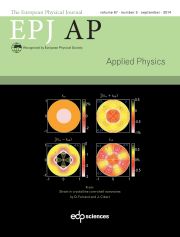Article contents
Tight focusing of radially polarized vortex laser pulse
Published online by Cambridge University Press: 11 June 2013
Abstract
The tight focusing of femtosecond radially polarized vortex laser pulse by a high numerical aperture objective is investigated in this paper. Based on Richards-Wolf vectorial diffraction theory, the electric field and the group velocity of the radially polarized vortex femtosecond laser pulse are studied in great detail. It finds that the femtosecond radially polarized vortex laser pulse can travel at various group velocities near the focus, that is, slower or faster than light velocity in vacuum, depending on the numerical aperture of the focusing objective system. Moreover, the effect of spherical aberration of objective, topological charge and time duration of the radially polarized vortex laser pulse on the group velocity distribution near the focus is discussed.
- Type
- Research Article
- Information
- Copyright
- © EDP Sciences, 2013
References
- 2
- Cited by


